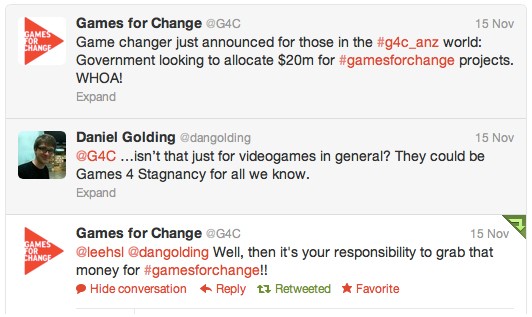
Let me make this as clear as possible: if the first Australian Games For Change conference is anything to go by, Games For Change has no agenda for change.
This is strange, given that Games For Change describes itself as an organisation that,
“facilitates the creation and distribution of social impact games that serve as critical tools in humanitarian and educational efforts.
Unlike the commercial gaming industry, we aim to leverage entertainment and engagement for social good.”
But if the first Australian version of the festival—which ran in Melbourne on the 15th and 16th of November—is any indication, then ‘change’ exists only as a nebulous, content-less banner to hang a populist hat on. With only a few notable exceptions, the Games For Change conference was a $795-a-head excuse for corporate consultants and retrograde entrepreneurs to congratulate each other and pontificate on old, under-developed ideas.
Worse, it was an opportunity for some to actively advocate game-like techniques that essentially aim to hoodwink a disgruntled populace into maintaining the status quo. The ‘zombie apocalypse’, warned one speaker, was right around the corner—chronic disengagement with work is “bad for all of us,” he said. But this—like a lot at Games For Change—was only a design problem to be overcome through game-like means, he argued. Disinterested workers could be ‘re-engaged’ in the workplace through turning training and other menial tasks into games.
The fact that the structures of contemporary life and the needs of neo-liberal capitalism might have an overriding impact was never even considered. It is not the bad job or the bad system that needs to be changed, in other words. It is only the bad mindset of our workers that needs alteration. If we can only make work fun, then we can continue to ignore job conditions.
Such a position was reinforced by the official conference game, which asked questions like ‘How do we make Melbourne an entrepreneurial city?’, with the obvious assumption that an increase in entrepreneurship is actually a desirable thing. Indeed, perhaps fewer self-described entrepreneurs would be a social good in itself.
Throughout these presentations, I was reminded of Robert Yang’s words about the New York Games For Change festival earlier this year:
“And all around the auditorium, with my eyes like dinner plates, I saw people eagerly taking notes and celebrating this as something other than a profound lack of imagination that utterly betrays its subject material.”
Nonetheless, there were two key differences from Yang’s stinging description above: one, that only a few in the audience responded to the most soulless presentations with unbridled enthusiasm; and two, that there were more than a handful of presentations that were very reasonable.
We heard of a game about refugees and displaced people (in much the same vein as perhaps Australia’s most significant political game, Escape From Woomera). We heard about videogame culture and the modern library, and videogame culture and the financial crisis. We heard from international game industry luminaries like Keita Takahashi and Heather Kelley. We heard about a technology lab for 10-16 year-olds with Asperger’s Syndrome or High Functioning Autism—an experiment that sounds like it is making a real difference in young people’s lives.
That there was some quality presentations does not mean that the Games For Change format has potential, but it does mean that there is (and always has been) room for socially and politically minded thought about videogames in Australia—thought that was happening long before this year’s Games For Change. These games do not need to be packaged up in a branded conference to survive. They do not need to be isolated from the rest of the world as a ‘Game For Change’. These are just videogames, and if they have clear progressive politics then they are all the better for it.
It is also worth noting at this point how unclear the Games For Change ambit is. Above all, this is illustrated by the festival’s array of speakers: consultants, lawyers, educators, researchers, CEOs, entrepreneurs—and some designers and creatives.
Early on the morning of the first day of the conference, a new federal funding scheme for videogames was announced. This was for videogames across the board—political agendas were irrelevant—yet the international Games For Change twitter account greeted this news as, “Government looking to allocate $20m for #gamesforchange projects. WHOA!”
On my suggestion that this news didn’t really have much to do with Games For Change specifically, the account’s response was that, “Well, then it’s your responsibility to grab that money for #gamesforchange!!”

This is the all-encompassing logic of Games For Change: not limited by definition, by boundary, or by simple good taste. All videogames might be Games For Change, and everyone should be looking to give Games For Change a leg up.
Another example: the Games For Change arcade was capably curated yet equally hobbled by the empty scaffolding of the festival. Many excellent videogames were on show in the space below RMIT’s new Design Hub, but few could be meaningfully described as having an agenda. Johann Sebastian Joust and Ninja might be popular and entertaining, but in no way do they take a position for change. The same goes for otherwise interesting games B.U.T.T.O.N. and Hanging Off A Bar.
Out of the 20-plus games in the arcade, perhaps only Conor O’Kane’s provocative Harpooned, where players hunt whales for ‘research’, and Wildfire, a game about social activism, illustrated any sort of political or social position—without even saying anything about their quality or the depth of their politics.
This is not the fault of curation — it is a symptom of the absence of a uniting vision for the conference: in a world where ‘change’ is just the wisp of good intentions, then why isn’t J.S. Joust a Game For Change? It is no more or less a “critical tool in humanitarian and educational efforts” than most other things at the conference.
If Games For Change is to continue, it needs to draw a clearer picture not only of what a game for change might look like, but what kind of change they are actually pushing for.
This was the greatest failing of last week’s conference. There was simply no articulation of what kind of change was desirable. All causes were even, regardless of whether that cause was a sense of empathy for refugees, or getting tertiary students more engaged in learning Chinese, or teaching children to better understand their role as a consumer and worker (an educational game set in a shopping mall was quietly described by another attendee as a ‘Baudrillian nightmare’), or preserving Australia’s levels of corporate productivity.
With a usual festival, you wouldn’t always need a transparent position statement—instead, positions would surface through curation. Yet at Games For Change we saw an almost radical depoliticisation of ‘change’, with a scattershot approach that saw politics of an entire spectrum get a look in. By aiming so broadly, everything is devalued.
This is what’s at stake here. Even by its own simple test—“to leverage entertainment and engagement for social good”—the Games For Change conference was a failure.
As long as events like Games For Change continue to emulsify such disparate threads under a single brand, it will remain a dead-zone: too establishmentarian for progressive politics, and too hollow for game-makers.







Crikey is committed to hosting lively discussions. Help us keep the conversation useful, interesting and welcoming. We aim to publish comments quickly in the interest of promoting robust conversation, but we’re a small team and we deploy filters to protect against legal risk. Occasionally your comment may be held up while we review, but we’re working as fast as we can to keep the conversation rolling.
The Crikey comment section is members-only content. Please subscribe to leave a comment.
The Crikey comment section is members-only content. Please login to leave a comment.